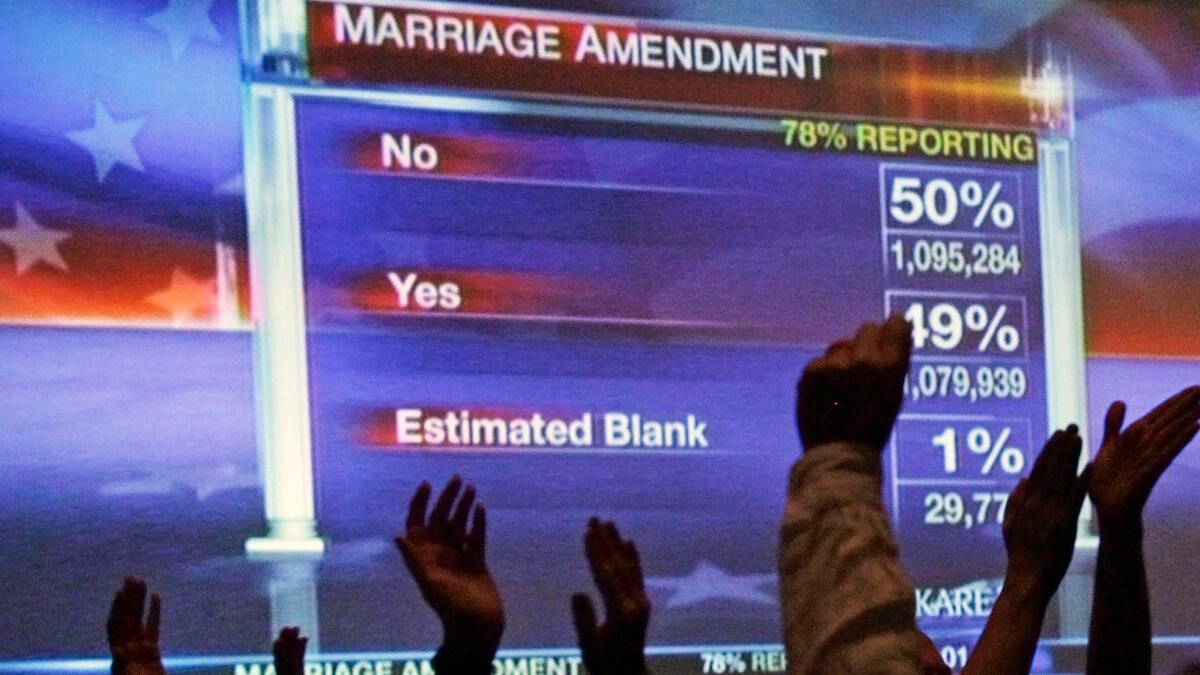
Supporters of same-sex marriage won a series of impressive victories in Tuesday’s balloting across the country, but those successes in no way demonstrate the emergence of a new national consensus. While advocates celebrated major advances for what they call “marriage equality,” the similarly impassioned activists on the other side of the issue haven’t surrendered or abandoned the field.
After more than 30 failed attempts to promote the redefinition of marriage through direct vote of the people at the state or local levels, gay rights campaigners won hard-fought battles in four states this time. In Washington, Maine, and Maryland, voters gave official recognition to same-sex marriage, and in Minnesota they turned down a constitutional amendment limiting matrimony to one man and one woman.
But the results in each case proved surprisingly close, showing far less support for gay marriage than pre-election polls had indicated. The winning percentage in each state ranged from a high of 53 percent in Maine to a low of 51 percent in Minnesota.
Moreover, each of the targeted states displayed an unmistakably blue coloration, delivering significantly bigger margins for President Obama than they did for same-sex marriage. In Maryland, the Democratic ticket of Obama-Biden prevailed by a commanding 62 to 37 percent margin, but gay marriage passed by 52 to 48. In other words, among those who cast Democratic ballots in the state, a full 16 percent disagreed with the president on the issue of redefining marriage. The numbers suggest that in every state, tens of thousands of people who supported Obama voted against gay marriage, while there’s no evidence that a significant number of Mitt Romney backers simultaneously endorsed the redefinition of matrimony.
All the states now authorizing same-sex marriage (Connecticut, Iowa, Massachusetts, New Hampshire, Vermont, New York, the District of Columbia, and now Maine, Maryland, and Washington) count among the most reliably liberal and Democratic jurisdictions in the country. And all delivered their electoral votes to Obama by comfortable margins. Among the gay marriage states, only New Hampshire and Iowa counted as battlegrounds in this election, and in Iowa the redefinition of marriage occurred through an order of the state Supreme Court, not through the vote of the people or their elected representatives. Indeed, three of the four justices who issued that Iowa decree found themselves removed from office by an angry electorate, though the fourth justice apparently survived a similar attempt at removal this year. Even while losing the White House, Romney still carried 24 states, and it’s hard to imagine any of those conservative commonwealths (Mississippi? Missouri? Idaho? Texas?) backing bids to redefine marriage.
The claim that Republicans hurt themselves by opposing same-sex marriage looks utterly unsupported by the electoral evidence. Tuesday’s votes for gay marriage, and against a constitutional amendment preventing it in Minnesota, remained close everywhere, showing that even in Democratic bastions like Maryland and Washington, public opinion remains sharply divided. In all four states, Democrats voted for the Republican position—opposing marriage redefinition—rather than Republicans voting on the Democratic side. Since political strategy demands uniting your own side while dividing the opposition, the GOP should feel encouraged that one of six Maryland Democrats sided with them on one of the hottest issues of the day. Gay marriage opponents drew 47 percent of the vote in Maine, a state that Obama carried by 15 points, so Republicans might well conclude that the party’s position on the issue could help make them more competitive in the state, not less so.
The recent shift in public opinion on same sex relationships is still real and significant. Ten years ago, no one would have imagined that even reliably liberal states like New York and Connecticut would declare someday that same-sex unions deserve identical government treatment to male-female marriage. It’s also true that young people support gay marriage far more enthusiastically than do their elders, and they may well maintain these attitudes as they grow older.
For now, however, disagreements on the marriage issue continue to divide the nation as a whole and even those states that just voted for same-sex matrimony. Gay rights champions gained ground and won historic battles on Tuesday, but the larger war remains pointedly unresolved.






